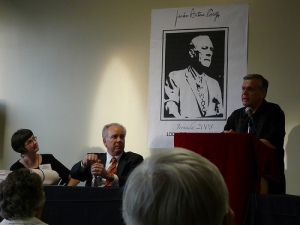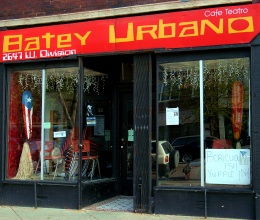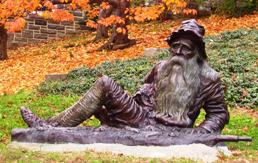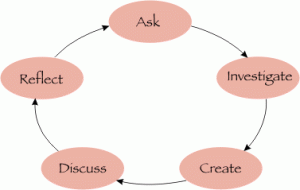Dick Morris, a self-serving commentater who has managed to advise both the Clinton and Bush White Houses, is now pushing an apocalyptic vision for public education. The states, he claims in a new book, will shift strongly to the GOP in 2010 and will assert their 10th amendment constitutional rights. Their Attorneys General will take action against all Federal encroachments on State powers in domains left to the states under the reserved powers clause.
As a federalist I also think this is long overdue. Connecticut, my adoptive state, contemplated a 10th amendment suit against NCLB. California has been struggling to assert some control over its natural environment and has been blocked by weak federal environmental protection laws that pre-empt state legislation.
Morris's claim is that once the states successfully get out from under federal educational policy initiatives they will open the spigots on charter schools, vouchers, and homeschools, and will completely tear down the public school system.
This movement to replace the public schools with charter schools is already a trend, as witnessed in New Orleans. If this spreads it will be on a regional basis; some states will lead and others will be very reluctant to follow.
Marc Lilla has a fascinating article in this week's NYRB on the Tea Party and the New Jacobins. He says that the current political climate is the outcome of two successful revolutions: the 1960s revolution of individual self-expression and the 1980s Reagan revolution of privatisation. Combined, these two shifts have left individuals to act as they choose and to free themselves from large institutions, now discredited as corrupt and ineffective, to do all manner of things for themselves that they don't have a clue how to do -- including, educate their children and care for their own health.
I am not as dismissive as Lilla about the capacities of ordinary people, and I am not nearly as enamoured by the institutions whose collapse he fears. maybe I am just an unconscious product of this double revolution myself.
But Lilla has a very important point: once these institutions are de-composed, then given the double revolution it will be difficult to put them -- or successor institutions that we will badly need --back into place.
A few charter schools and homeschools is one thing; a nation state without the means to create society is quite another.
Social Issues is a blog maintained by the John Dewey Society's Commission on Social Issues.
Showing posts with label community. Show all posts
Showing posts with label community. Show all posts
Sunday, May 9, 2010
Tuesday, June 2, 2009
Community as Intellectual Space, 2009
 The fifth annual Community as Intellectual Space Symposium will be held on June 12-14 at La Estancia on 2753 W. Division Street, Paseo Boricua, Chicago, Illinois.
The fifth annual Community as Intellectual Space Symposium will be held on June 12-14 at La Estancia on 2753 W. Division Street, Paseo Boricua, Chicago, Illinois.The theme of the symposium is Critical Pedagogy: Community Building as Curriculum. As professionals and institutions are engaging with communities to enhance the life chances and well-being of residents, the conference examines how community-building and critical pedagogy can offer effective and sustainable change, locally and among collaborators as well.
 The keynote speaker this year is Antonia Darder, a Professor at the University of Illinois in Educational Policy Studies and Latino/a Studies. There will be presentations and workshops on
The keynote speaker this year is Antonia Darder, a Professor at the University of Illinois in Educational Policy Studies and Latino/a Studies. There will be presentations and workshops on- Community Based Research;
- Urban Agriculture;
- Community Informatics and Service-Learning;
- Social Emotional Learning at Dr. Pedro Albizu Campos High School;
- Critical Pedagogy and its Application to Teacher Certification;
- Community Health at the Barrio Arts, Culture, and Communications Academy;
- Community Archiving and Web 2.0 Cataloging.
The conference also offers Batey Urbano's production of Crime against Humanity, screenings of original documentaries filmed on Paseo Boricua, community tours, and art exhibits.
Community as Intellectual Space is co-organized by the Juan Antonio Corretjer Puerto Rican Cultural Center (Chicago) and the University of Illinois Graduate School of Library and Information Science. Continuing Professional Development Units (CDPUs), academic course credit for those who enroll in UI's LIS590 CIO, and registration scholarships available.
Cross post from Chip's Journey
Friday, November 28, 2008
Remaining Awake Through a Great Revolution
 On November 4, voters in the US made a momentous choice, not only by taking another step towards racial equality, but also by demanding new ways of relating to other countries, to injustice, to the environment, and to truth itself. As of today, that is only one step; nothing has changed except the direction we are pointed.
On November 4, voters in the US made a momentous choice, not only by taking another step towards racial equality, but also by demanding new ways of relating to other countries, to injustice, to the environment, and to truth itself. As of today, that is only one step; nothing has changed except the direction we are pointed.Where the path leads next depends even more on the rest of us than it does on President-Elect Obama. The great challenges of globalization, racism, poverty, and violence are unaffected by a single election. Yet, there is a risk that we can fall asleep, lose sight of those challenges, and begin to think only of narrow issues, such as many that surfaced in the campaign.
We have the opportunity now to respond to the challenges posed 43 years ago in Martin Luther King, Jr.'s excellent speech, Remaining Awake Through a Great Revolution. In his talk, he relates the story of "Rip Van Winkle," who slept 20 years. But he reminds us that when Rip went up to the mountain, the sign on the local inn had a picture of King George III of England. Twenty years later, the sign had a picture of George Washington. Rip had not only slept 20 years; he had slept through a revolution. As King says, "Rip Van Winkle knew nothing about it; he was asleep."
King saw that we are experiencing a scientific and technological revolution, one that challenges us to remain awake, and to develop a world perspective. It's more imperative than ever to eradicate racial injustice and rid the world of poverty, and to find an alternative to war and bloodshed. Long before talk of flat worlds, King saw that our destinies were intertwined:

All I'm saying is simply this: that all mankind is tied together; all life is interrelated, and we are all caught in an inescapable network of mutuality, tied in a single garment of destiny. Whatever affects one directly, affects all indirectly. For some strange reason I can never be what I ought to be until you are what you ought to be. And you can never be what you ought to be until I am what I ought to be - this is the interrelated structure of reality...And by believing this, by living out this fact, we will be able to remain awake through a great revolution.
Remaining awake means looking beyond government as usual and recognizing that children in Haiti are in our "garment of destiny," as much a part of our world as the person next door. It means knowing that justice is an ongoing project that needs to be defended wherever we hear of abuses of human rights, not seeking ways to justify them. It means finding an end to wars, not simply moving from one venue to another.
Can we do any better now at addressing King's great challenges?
References
King, Jr, Martin Luther (1965, June). Remaining awake through a great revolution. Commencement address for Oberlin College, Oberlin Ohio.
Cross-posted from Chip's Journey
Wednesday, September 3, 2008
first Youth Community Informatics Forum
In the Youth Community Informatics Forum held June 27-28, 2008, about 40 young people and youth leaders came to Champaign from a variety of economically disadvantaged, mostly minority communities throughout the state.
There was a youth media festival on Friday. Then on Saturday, participants spent the morning working in one of four small groups to investigate "information spaces" in the community. These included the Center for Children's Books, Champaign Public Library, the Independent Media Center, Espresso Royale, Native House, Cafe Paradiso, Transit Plaza, Illini Union, and bronze plaques around campus. The group leader introduced a staff member from the center to the students for a small tour and helped them use a Flip video camera and a GPS receiver to record their observations.
At each site, the youth asked questions such as:
In the afternoon, they created a Google map with their videos, text, and GPS coordinates. They also added music (an innovation we hadn't planned on, but perfectly appropriate). They then shared their findings in a public presentation.
The activity was conceived in terms of an Inquiry Cycle:

We found that the students learned technology skills, problem solving, cooperative work, writing, public presentation, specific information spaces, community journalism, university life, and much more.
Although the June activity made use of diverse new technologies, it is important to note that the focus was on learning about the community, asking questions, and sharing findings with others, not on the technologies per se. The most effective use of these technologies in libraries and similar settings would likely involve embedding that use in a larger, purposeful context. That context in turn could be a way to help connect youth with other resources, such as books and structured activities.
We're now planning a similar activity in October with the Mortenson Center Associates, a group of visiting, international librarians. This will be the first day of a two- or three-day event. The longer time will allow for discussion about how the information spaces might differ in different countries, what technologies are available in different contexts, how valuable the activity would be for youth in their libraries, and so on. Students from the Community Informatics (LEEP) course would lead the investigation of the local-area information centers.
Both youth leaders and young people said they enjoyed the Forum, learned a lot, and hope for more. One youth leader said that next year he'd like to bring a much larger group. Another wrote,
As Myles Horton might say, that's a long haul, but at least there was good spirit of cooperation in learning, which I hope will carry over to continuing work in these communities.
[Cross-posted on Chip's Journey]
There was a youth media festival on Friday. Then on Saturday, participants spent the morning working in one of four small groups to investigate "information spaces" in the community. These included the Center for Children's Books, Champaign Public Library, the Independent Media Center, Espresso Royale, Native House, Cafe Paradiso, Transit Plaza, Illini Union, and bronze plaques around campus. The group leader introduced a staff member from the center to the students for a small tour and helped them use a Flip video camera and a GPS receiver to record their observations.
At each site, the youth asked questions such as:
- What do we see in this information center? How do we like it?
- What is this center about?
- What do we want people to know about the center?
- How can we give others a clear idea about the center through watching/hearing our report?
In the afternoon, they created a Google map with their videos, text, and GPS coordinates. They also added music (an innovation we hadn't planned on, but perfectly appropriate). They then shared their findings in a public presentation.
The activity was conceived in terms of an Inquiry Cycle:

- Ask: What are the information spaces in the community?
- Investigate: Visit, listen, explore, video, determine geo-coordinates.
- Create: Make a GIS site with video, music, text.
- Discuss: Share the product and the findings with others.
- Reflect: Think about issues of journalism, democracy, careers, technologies, etc.
We found that the students learned technology skills, problem solving, cooperative work, writing, public presentation, specific information spaces, community journalism, university life, and much more.
Although the June activity made use of diverse new technologies, it is important to note that the focus was on learning about the community, asking questions, and sharing findings with others, not on the technologies per se. The most effective use of these technologies in libraries and similar settings would likely involve embedding that use in a larger, purposeful context. That context in turn could be a way to help connect youth with other resources, such as books and structured activities.
We're now planning a similar activity in October with the Mortenson Center Associates, a group of visiting, international librarians. This will be the first day of a two- or three-day event. The longer time will allow for discussion about how the information spaces might differ in different countries, what technologies are available in different contexts, how valuable the activity would be for youth in their libraries, and so on. Students from the Community Informatics (LEEP) course would lead the investigation of the local-area information centers.
Both youth leaders and young people said they enjoyed the Forum, learned a lot, and hope for more. One youth leader said that next year he'd like to bring a much larger group. Another wrote,
I believe, in the not too distant future, that this conference will be seen as a landmark in developing a new perspective as part of the partnership between those marginalized sectors of civil society and the university in bridging the digital divide.
As Myles Horton might say, that's a long haul, but at least there was good spirit of cooperation in learning, which I hope will carry over to continuing work in these communities.
[Cross-posted on Chip's Journey]
Subscribe to:
Posts (Atom)